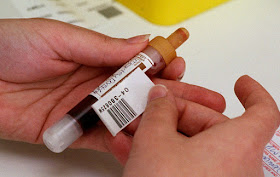A study by Preston and colleagues looked at men who were participants in the Physicians' Health Study and for whom there were 30 years of follow-up. Blood samples from the time of study initiation were obtained and then analyzed for baseline prostate-specific antigen (PSA) levels.
Men were divided into three age groups: 40-49 years, 50-54 years, and 55-59 years. They compared men who developed lethal prostate cancer with those who were not diagnosed with prostate cancer over the 30-year period.
They found that baseline PSA was very predictive of risk of developing lethal cancer in the future. For example, if men had a greater than 90th percentile PSA at baseline, the odds ratio of developing lethal cancer ranged from 6.9 [55-59 years] to 12.6 [50-54 years] over the 30-year follow-up period.
Read more:
It's Surprising What One PSA Can Predict
Source: Medscape

No comments:
Post a Comment